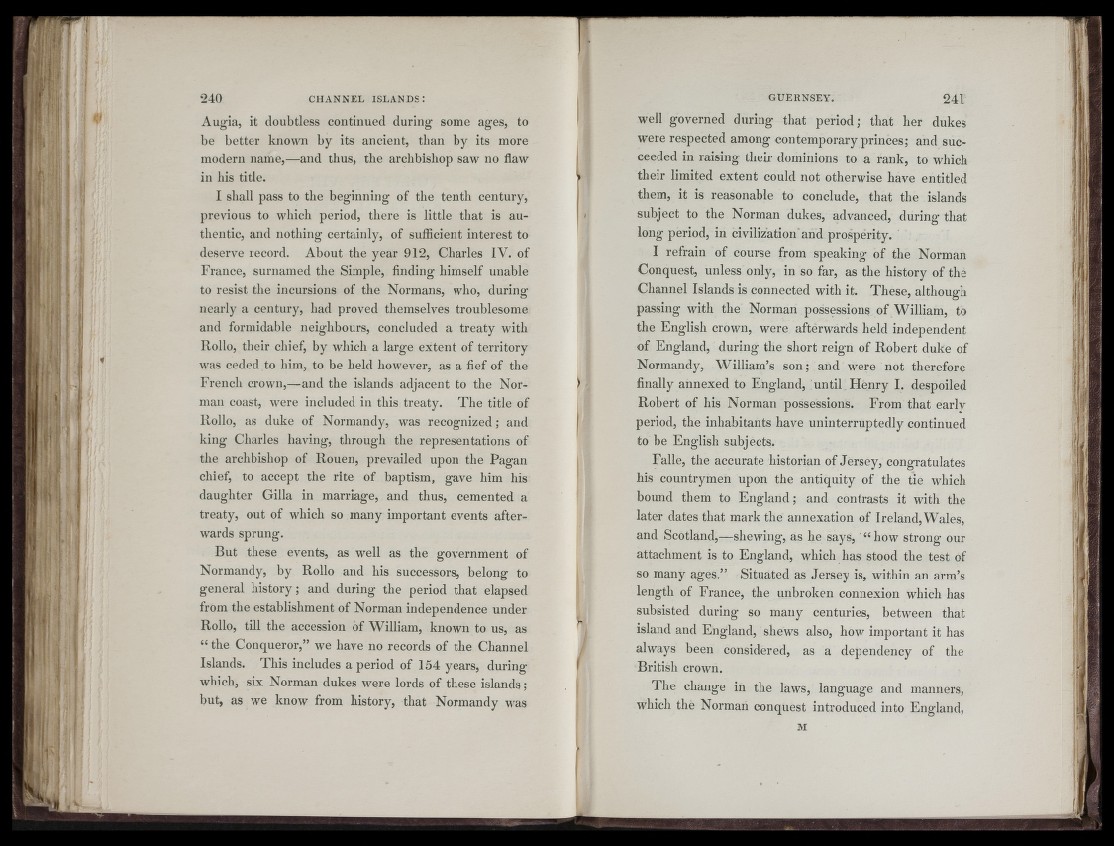
1« I
■ hM.;
i fXi
s ■ -
- } r
!’ ^ Ii
i
I
' L
I
ki
§ 4 :
; i if
! !
M i l ! | .
■M
tif f.
- f i
•240 CHANNEL islands:
Augia, it doubtless continued during some ages, to
be better known by its ancient, than by its more
modern name,—and thus, the archbishop saw no flaw
in his title.
I shall pass to the beginning of the tenth century,
previous to which period, there is little that is authentic,
and nothing certainly, of sufficient interest to
deserve record. About the year 912, Charles IV. of
France, surnamed the Simple, finding himself unable
to resist the incursions of the Normans, who, during
nearly a century, had proved themselves troublesome
and formidable neighbours, concluded a treaty with
Rollo, their chief, by which a large extent of territory
was ceded to him, to be held however, as a fief of the
French crown,—and the islands adjacent to the Norman
coast, were included in this treaty. The title of
Rollo, as duke of Normandy, was recognized; and
king Charles having, through the representations of
the archbishop of Rouen, prevailed upon the Pagan
chief, to accept the rite of baptism, gave him his
daughter Gilla in marriage, and thus, cemented a
treaty, out of which so many important events afterwards
sprung.
But these events, as well as the government of
Normandy, by Rollo and his successors, belong to
general history; and during the period that elapsed
from the establishment of Norman independence under
Rollo, till the accession of William, known to us, as
“ the Conqueror,” we have no records of the Channel
Islands. This includes a period of 154 years, during
which, six Norman dukes were lords of these islands ;
but, as we know from history, that Normandy was
.
GUERNSEY. 241
well governed during that period; that her dukes
were respected among contemporary princes; and succeeded
in raising their dominions to a rank, to which
their limited extent could not otherwise have entitled
them, it is reasonable to conclude, that the islands
subject to the Norman dukes, advanced, during that
long period, in civilization and prosperity.
I refrain of course from speaking of the Norman
Conquest, unless only, in so far, as the history of the
Channel Islands is connected with it. These, although
passing with the Norman possessions of William, to
the English crown, were afterwards held independent
of England, during the short reign of Robert duke of
Normandy, William’s son; and were not therefore
finally annexed to England, until Henry I. despoiled
Robert of his Norman possessions. From that early
period, the inhabitants have uninterruptedly continued
to be English subjects.
Falle, the accurate historian of Jersey, congratulates
his countrymen upon the antiquity of the tie which
bound them to England; and contrasts it with the
later dates that mark the annexation of Ireland, Wales,
and Scotland,—shewing, as he says, “ how strong our
attachment is to England, which has stood the test of
so many ages.” Situated as Jersey is, within an arm’s
length of France, the unbroken connexion which has
subsisted during so many centuries, between that
island and England, shews also, how important it has
always been considered, as a dependency of the
British crown.
The change in the laws, language and manners,
which the Norman conquest introduced into England,